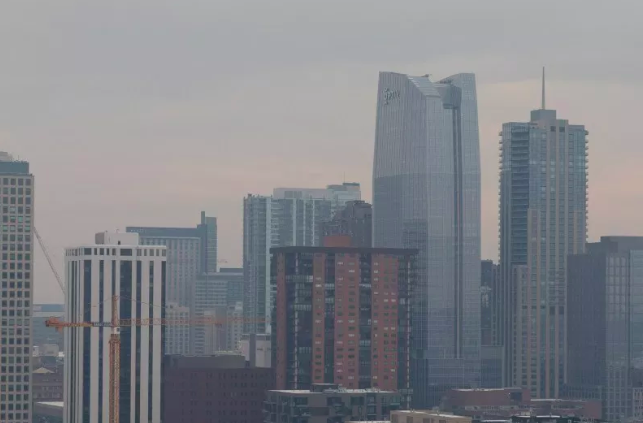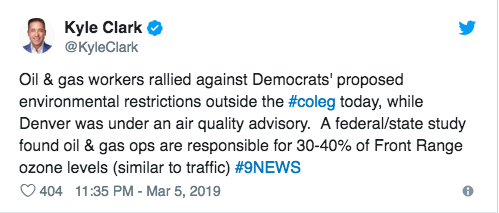
The “brown cloud” over Denver on March 6, 2019 Photo: Andy Bosselman, StreetsblogDenver
Last summer, prior to the election for Governor in Colorado, the Environmental Protection Agency (EPA) granted the state an extension to meet the National Air Quality Standards — claiming that rapid growth was making it too difficult to come back into compliance. Yesterday, the new Governor revoked the request and has pledged to move aggressively to get ozone air pollution under control. The state said in a letter to the EPA the Colorado Department of Public Health and Environment (CDPHE) said they “believe that the interests of our citizens are best served by moving aggressively forward and without delay in our efforts to reduce ground level ozone concentrations in the Denver Metro/North Front Range non-attainment area.”
- Colorado’s “brown cloud” is a continuing problem — for example, on March 6th of this year, Denver’s air quality index measured 162, an unhealthy level more than three times worse than the moderate rating of 51 now in Beijing, triggering health warnings in the region.
- Colorado has failed to meet the federal standards for about seven years.
- Last year, the EPA determined that Colorado is a serious violator of air quality standards — there were 55 days when citizens of the state were warned against outdoor exercise because pollution levels were so high that is could be damaging to their health.
- Ozone pollution caused by cars is the biggest problem, but oil and gas pollution is also a large factor in poor air quality in the state.
- The state is hoping to be fully compliant by the summer of 2021.
The Governor intends to use three strategies to cut air pollution — transitioning to 100 percent renewable energy as soon as possible, tightening oil and gas drilling regulations, and requiring more zero-emission electric vehicles.
Why This Matters: The oil and gas lobby in the State of Colorado is quite strong — early in March they lobbied the state legislature hard against environmental regulations that would force them to reduce the air pollution caused by their exploration and drilling activities. And yet while that was happening, the state was busy warning the public to limit their outdoor activities because of horrible levels of air pollution that made it hard to see across the city’s skyline. Denver’s pollution is caused by its growth — people are flocking there to enjoy the rocky mountains and the quality of life living closer to nature. But if the air quality is worse in Denver than in Bejing for nearly 2 months a year, will the city be able to boast of its quality of life and potential for outdoor fun? Poor air quality is a health and an economic problem and one thing is clear — the Governor understands he must clear the air.

April 2, 2019 » air pollution, clean air, Colorado, Denver, ozone, smog


